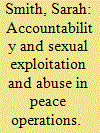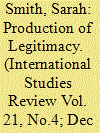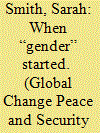| Srl | Item |
| 1 |
ID:
153268


|
|
|
|
|
| Summary/Abstract |
In March 2016, the United Nations Security Council adopted its first resolution devoted entirely to the prevention of peacekeeper sexual exploitation and abuse (SEA) in peace operations. This article examines resolution 2272 by drawing on past practice and the perspective of those at mission sites—namely, Timor-Leste—arguing that the mechanism it establishes—repatriation—is limited in its capacity to prevent SEA and provide justice outcomes. The article demonstrates the pervasive sense of powerlessness regarding SEA and the impunity of those who do perpetrate SEA. The article further situates the issue of SEA by peacekeepers in the post-conflict (gendered) context in which it occurs, arguing that the resolution does not challenge the underlying norms and gendered relations of power that underpin peace operations. Instead, the resolution frames SEA as chiefly an issue of embarrassment for the United Nations and makes scant mention of the populations that peace operations are mandated to protect, as well as the perspectives and needs of victims of SEA.
|
|
|
|
|
|
|
|
|
|
|
|
|
|
|
|
| 2 |
ID:
170370


|
|
|
|
|
| Summary/Abstract |
Peace operations have increasingly sought to demonstrate their legitimacy in the face of critiques that characterize them as top-down impositions with limited impact and which entail a host of unintended consequences. Each book under review explores in depth the institutional consignment and attribution of legitimacy to certain spaces, actors, and bodies, which can serve to confirm and embed hierarchical relations of power. Von Billerbeck delineates the ambivalence with which “local ownership” is deployed in peace operations, closing down knowledge exchange rather than presenting opportunity. Shepherd builds on similar insights and argues that gendered logics and power inform the conceptualization and deployment of “local” and “civil society” and thus the (relative) lack of legitimacy afforded to these spaces. This essay seeks to develop from these insights further, drawing especially on postcolonial and critical race theory to demonstrate how race and racism structure the production and use of such categories, in both peace operation practice and international relations more broadly.
|
|
|
|
|
|
|
|
|
|
|
|
|
|
|
|
| 3 |
ID:
142023


|
|
|
|
|
| Summary/Abstract |
This article examines gender mainstreaming processes in successive UN peacebuilding missions in Timor-Leste, with a focus on the relationship between these missions and the national women's organizations who were vehicles for implementation. Apparent frictions occur in this process and the article suggests that the gender rhetoric and practice incorporated into UN peacebuilding since 2000 can have potentially destabilizing effects for women's activism in post-conflict settings. Women's organizations socialize and negotiate around gender norms in order to mitigate this potential and aim to identify the synergies between women's activism before peacebuilding, and gender mainstreaming policies and practice post-conflict. This article provides insight into how national women's organizations socialize gender norms, as well as how women's post-conflict activism can be shaped by the presence of UN peacebuilding.
|
|
|
|
|
|
|
|
|
|
|
|
|
|
|
|